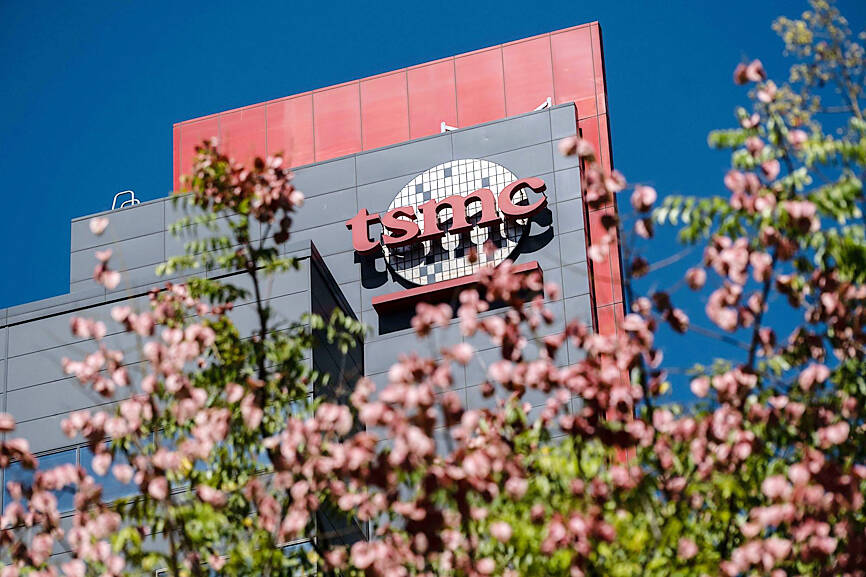Taiwan Semiconductor Manufacturing Co (TSMC, 台積電) has announced that plans to bring its advanced 2-nanometer (nm) technology into mass production by 2025 are still on track.
TSMC is battling to maintain its lead over main rivals Intel Corp and Samsung Electronics Co, which aim to start production of 2nm chips next year and in 2025 respectively.
TSMC announced the timeline for 2nm production at its North America Technology Symposium in Santa Clara, California, on Wednesday.

Photo: Bloomberg
More than 1,600 customers and partners registered to attend the event, the first of an international series of technology symposiums hosted by the world’s largest contract chipmaker, TSMC said.
During the event, TSMC showcased its latest technology developments, including progress in 2nm technology and new members of its industry-leading 3nm technology family, as well as 3DFabric, a comprehensive family of 3D silicon stacking and advanced packaging technologies.
The company said that the development of its 2nm technology, which utilizes nanosheet transistors, was making progress in yield and device performance, and it is set to enter production in 2025 as scheduled.
The company’s 2nm technology would be up to 15 percent faster than its 3nm enhanced (N3E) process technology at the same power, with up to 30 percent lower power use at the same speed, and chip density of more than 15 percent greater than N3E.
Regarding its N3E products, TSMC said its 3nm technology was in volume production, with an enhanced N3E version set to enter high-volume manufacturing in the second half of this year.
Following N3E, TSMC would continue to optimize the N3 family’s transistor density with 3nm performance enhanced technology, which would build on N3E by offering better power, performance and density, the company said, adding that production would be ready in the second half of next year.
Its N3X product, which is tailored for high-performance computing applications and can support higher voltage and frequency — and therefore has stronger computing power — is to enter mass production in 2025, it said.
In addition, its Auto Early product would be available this year, offering automotive process design kits based on N3E, and allowing customers to launch designs on the 3nm node for automotive applications, leading to the fully automotive-qualified N3A process in 2025, TSMC said.

In Italy’s storied gold-making hubs, jewelers are reworking their designs to trim gold content as they race to blunt the effect of record prices and appeal to shoppers watching their budgets. Gold prices hit a record high on Thursday, surging near US$5,600 an ounce, more than double a year ago as geopolitical concerns and jitters over trade pushed investors toward the safe-haven asset. The rally is putting undue pressure on small artisans as they face mounting demands from customers, including international brands, to produce cheaper items, from signature pieces to wedding rings, according to interviews with four independent jewelers in Italy’s main

Japanese Prime Minister Sanae Takaichi has talked up the benefits of a weaker yen in a campaign speech, adopting a tone at odds with her finance ministry, which has refused to rule out any options to counter excessive foreign exchange volatility. Takaichi later softened her stance, saying she did not have a preference for the yen’s direction. “People say the weak yen is bad right now, but for export industries, it’s a major opportunity,” Takaichi said on Saturday at a rally for Liberal Democratic Party candidate Daishiro Yamagiwa in Kanagawa Prefecture ahead of a snap election on Sunday. “Whether it’s selling food or

CONCERNS: Tech companies investing in AI businesses that purchase their products have raised questions among investors that they are artificially propping up demand Nvidia Corp chief executive officer Jensen Huang (黃仁勳) on Saturday said that the company would be participating in OpenAI’s latest funding round, describing it as potentially “the largest investment we’ve ever made.” “We will invest a great deal of money,” Huang told reporters while visiting Taipei. “I believe in OpenAI. The work that they do is incredible. They’re one of the most consequential companies of our time.” Huang did not say exactly how much Nvidia might contribute, but described the investment as “huge.” “Let Sam announce how much he’s going to raise — it’s for him to decide,” Huang said, referring to OpenAI

The global server market is expected to grow 12.8 percent annually this year, with artificial intelligence (AI) servers projected to account for 16.5 percent, driven by continued investment in AI infrastructure by major cloud service providers (CSPs), market researcher TrendForce Corp (集邦科技) said yesterday. Global AI server shipments this year are expected to increase 28 percent year-on-year to more than 2.7 million units, driven by sustained demand from CSPs and government sovereign cloud projects, TrendForce analyst Frank Kung (龔明德) told the Taipei Times. Demand for GPU-based AI servers, including Nvidia Corp’s GB and Vera Rubin rack systems, is expected to remain high,